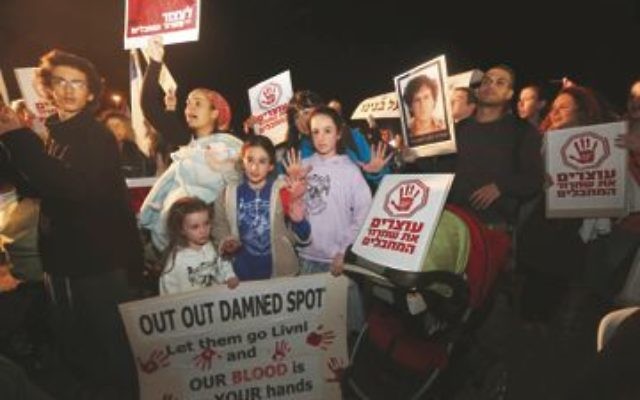Thousands protest prisoner release
For the second time since restarting negotiations with the Palestinian Authority, Israel is in the process of releasing terrorists from its prisons.
As The AJN went to press, Jerusalem was making final preparations to release 26 prisoners held in Israeli jails. All of them committed acts of terror before the Oslo peace process began in the 1990s.
While the first release in August generated some internal tensions, the reaction on the Israeli right this time around has been much sharper, in a large part because the recent spate of terror incidents in the West Bank has increased antagonism towards Palestinians.
As well as proving divisive in the government, this week’s release generated popular protest, with almost 3000 people demonstrating against the release outside the prison where the inmates were held.
One group set up to oppose the release, which calls itself Sorry We Forgot, placed signs over graves in Israel’s most important military cemetery, on Mount Herzl. The signs, which bore a mock signature by the “government of Israel,” said: “From our perspective, your deaths were in vain.” The group claims that releasing terrorists undermines the efforts of soldiers who risked their life to arrest them.
The terrorists leaving prison include Shabir Kassem Hazem, who together with a partner killed Holocaust survivor Isaac Rothenberg with an axe 20 years ago. Ahmed Damouni murdered army reservist Amnon Pomerantz, who got lost on his way to an army base, in 1990. Another killer going free is Rahman Abdel Hajj, who murdered Genia Friedman, a woman who was out walking in Petach Tikvah in 1992.
Israel’s Prime Minister Benjamin Netanyahu said that whatever opposition has surfaced towards the US-brokered release, it had to go ahead. “We have to honour government decisions even if it is difficult and unpleasant, we can’t constantly change our stance,” he told his cabinet.
A statement from the government stressed that it will work to ensure that the prisoners released do not reoffend, saying that “any prisoner who resumes hostile activity will be returned to serve the remainder of his sentence.” Shortly before the scheduled release, Israel’s chief negotiator Tzipi Livni claimed that it was in the “national interest” and Strategic Affairs Minister Yuval Steinitz said that it is preferable to freezing settlement, which was an alternative concession requested by the Palestinians in the framework of the negotiations.
The Almagor organisation of terror victims’ families, asked the High Court to intervene to stop the release, claiming in a petition that freeing terrorists “strikes a fatal blow to the existence of a society founded on the values of ethics and law.” The court rejected its request.
NATHAN JEFFAY


comments